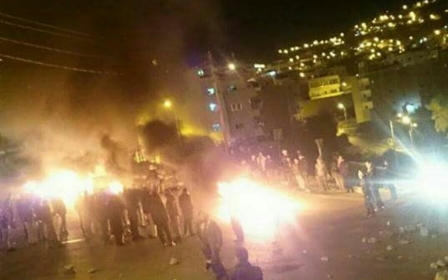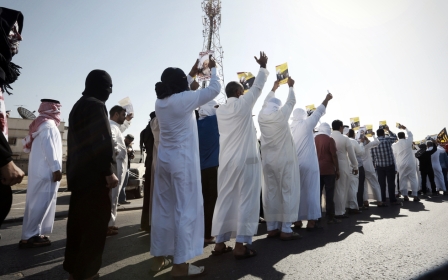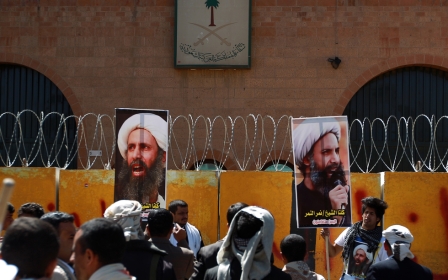Executed Saudi Sheikh Nimr was not a terrorist

Although Saudi Arabia has made headlines on Saturday after executing 47 people convicted of "terrorism", much of the international coverage has recently focused on the kingdom's foreign affairs.
Last month, Saudi Arabia captured the world’s attention with the announcement of an anti-terror coalition. The international community hurried to pick apart the details with a fine-toothed comb, and a legion of commentators offered their thoughts on Saudi’s role in the international playing field. But while analysis has been firmly focused at the international level, local drama has continued to quietly unfold inside the kingdom.
In late November, a media storm erupted when several Saudi newspapers leaked the impending execution of at least 50 “terrorists from al-Qaeda and Awamiyya”. The news drew the attention of numerous human rights organisations, which have repeatedly voiced concern over Saudi Arabia’s overly-inclusive definition of “terrorism”. The Specialised Criminal Court (SCC), established to handle terrorism cases in 2008, has tried and convicted a number of human rights defenders since its inception. Just this October, the SCC sentenced several founding members of a Saudi human rights organisation to 8-10 years in prison for what basically amount to thought crimes against the ruling family.
The concern, then, is that when Saudi Arabia announces the impending execution of terrorists, that decision also includes political activists and nonviolent government opponents. These fears were first confirmed when at least six Shia activists, including minors at the time of their arrest, made their way onto the list of “terrorists” awaiting imminent execution. And while the international community pivots its attention away from the Kingdom’s domestic activities, the dire threat for those awaiting execution remains as salient as ever.
Perhaps the most well-known of these Awamiyya “terrorists” is Sheikh Nimr Baqir al-Nimr, a prominent Shia cleric and peaceful dissenter from the Eastern Province who became an opposition figurehead during the 2011-2012 protests in Saudi Arabia.
Sheikh Nimr was among the 47 people executed on Saturday.
The Saudi authorities had violently arrested Sheikh Nimr in July 2012 and charged him with “inciting sectarian strife and supporting rioting”, largely based off the content of his peaceful, if fiery, sermons. On 15 October 2014, a military court sentenced him to death. UN human rights experts have criticised the arrest and sentencing of Sheikh Nimr through several communications to the Saudi government. In the communications, the experts express concern at allegations that authorities tortured Sheikh Nimr, that his trial did not comply with due process and fair trial guarantees, and that he did not receive adequate medical attention for his wounds.
Both the Saudi media and the Saudi government have gone to great lengths to paint Sheikh Nimr as an emblem of Shia terrorism. A public statement by advisers to Defence Minister Prince Mohammed bin Salman published in November claims that “the al-Nimr family members pursued violence and attacks on security forces and government facilities beside terrorising civilians”. An article published in the London-based, Saudi-backed newspaper al-Sharq al-Awsat makes similar allegations. The article, entitled, “Al-Nimr and al-Shuweil: Two Terrorist Theorists from Two Doctrines on One Scale”, alleges that Sheikh Nimr and al-Qaeda member Faris al-Shuweil are “a single coin,” each representing a different side of terrorist thought.
The contents of Sheikh Nimr’s sermons tell a different story. In his speeches, he repeatedly calls for nonviolence in the face of government oppression. In a sermon outlining his vision for resistance, Sheikh Nimr stated, “the roar of the word is mightier than the sound of bullets,” and took great care to explain that violence would not produce positive results. In another sermon, he urged protesters to demonstrate peacefully, saying: “When we see an armed person in a demonstration, we will tell him this is unacceptable. Go home, we don’t need you.” An Amnesty International review of his speeches confirmed the peaceful nature of his dissent, altogether failing to find any evidence of incitement towards violence.
Allegations that Sheikh Nimr is an agent of Iran also play a large role in the government’s defamation campaign against him. The same al-Sharq al-Awsat article condemns Nimr’s “inflammatory speeches coming from Qom, Iran”. Again, his own words suggest the opposite. In multiple speeches, Sheikh Nimr goes to great lengths to emphasise that Saudi Shia speak only for themselves. In one sermon, he claimed, “We have no ties with Iran or any other country. We are connected to our values, and we will defend them, even if your media continues with its distortions.”
Among other “terrorists” are three Shia protesters who were arrested for their alleged crimes as minors: Ali al-Nimr, Abdullah al-Zaher, and Hussein al-Marhoon. Security forces arrested Ali al-Nimr, the nephew of Sheikh Nimr, for participating in protests in the Eastern Province in February 2012. Saudi officials allegedly tortured him during detention and coerced him into confessing to a series of charges, including joining a “terrorist cell”. Saudi Arabia’s national security court later used this confession to sentence him to death. On 8 October 2015, the European Parliament passed a resolution calling on Saudi Arabia to pardon Ali and halt his execution, further criticising the government’s use of the national security court to prosecute peaceful dissidents.
On 17 December 2015, as international attention focused on Saudi Arabia’s new coalition, Abdullah al-Zaher’s family pleaded with the international community to intervene on his behalf before it was too late. In a statement to The Guardian, Abdullah’s father begged for help, saying: “He doesn’t deserve to die just because he participated in a protest rally.”
As media attention refocuses on Saudi Arabia’s international exploits, the domestic landscape remains troubled. Portraying minors and reformers as terrorists allows Saudi Arabia to justify the inhumane punishment of its own citizens. On 21 December, the terrorism tribunal found blogger Zuhair Kutbi guilty of unknown charges, sentencing him to four years in prison, a five-year travel ban, a $26,600 fine, and a 15-year writing ban. As the convictions mount and the execution count rises, the threat that Saudi Arabia will execute more “terrorists” looms ever larger. It is this threat that the international community would do well not to forget.
- Ellen Duthoy is an advocacy fellow at Americans for Democracy & Human Rights in Bahrain.
The views expressed in this article belong to the author and do not necessarily reflect the editorial policy of Middle East Eye.
Photo: Yemeni protesters take part in a demonstration outside the Saudi embassy in Sanaa against the death sentence on Shiite cleric and anti-government protest leader Nimr al-Nimr (portrait) in Sanaa, on 18 October, 2014 after he was convicted by Saudi authorities of sedition (AFP).
New MEE newsletter: Jerusalem Dispatch
Sign up to get the latest insights and analysis on Israel-Palestine, alongside Turkey Unpacked and other MEE newsletters
Middle East Eye delivers independent and unrivalled coverage and analysis of the Middle East, North Africa and beyond. To learn more about republishing this content and the associated fees, please fill out this form. More about MEE can be found here.





